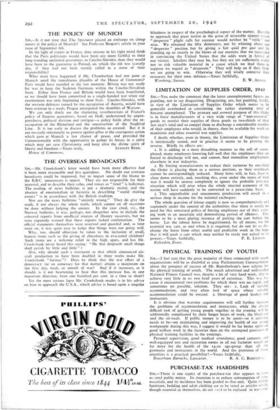PURCHASE-TAX HARDSHIPS
Stst,—There is one aspect of the purchase-tax that appears to hart es:aped public notice. Its intention is to reduce consumption of non- essentials, and its incidence has been graded to that end. Quite richly furniture, bedding and adult clothing are to be taxed as articles which, though essential in themselves, do not rezd to be replaced in war-time.
But this tax is going to hit doubly hard those unfortunate people who suffer loss of property in air-raids. Many will consider their loss as part of the contribution that anyone may be called upon to make to the national effort, and will suffer it cheerfully. But to be taxed on such loss is neither fair nor in accordance with the principles of taxation.
The position with regard to damage to houses is even less satis- factory. The tax will presumably be incurred on the materials used for repair, but will not be collected until the war is over, for its pay- ment by the Local Authority does no more than transfer the money from one of the exchequer pockets to another. In this case the tax will perform neither its function of reducing consumption nor that of obtaining money for the immediate conduct of the war.
The case for some adjustment of the tax to cover such cases seems
clear.—Yours faithfully, A. SANDISON. Corner House, Ackworth Road, Pontefract, Yorks.



























 Previous page
Previous page